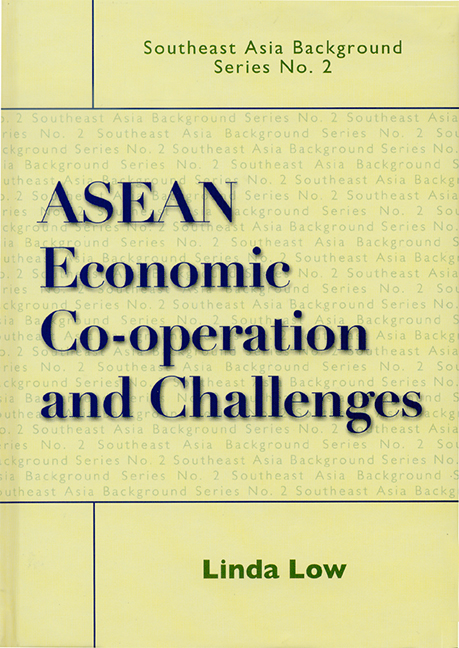6 - Prospects and Prognosis
Published online by Cambridge University Press: 21 October 2015
Summary
INTRODUCTION
A stocktaking of the first five chapters seems to suggest that if early ASEAN between 1967 and 1976 was deemed disappointing in terms of tangible economic results, the achievements since 1976 appear no better. Granted that some strides have been made in moving from the ASEAN Preferential Trade Arrangement (PTA) to the ASEAN Free Trade Area (FTA) in the first instance, one very notable feature of ASEAN's success is that it is due more to national achievements than an overarching ASEAN economic framework as in the case of European integration. While ASEAN infrastructural and institutional frameworks provided the necessary conditions for the region to enjoy a fair amount of stability and cohesion, whether as one voice in international, multilateral settings as in the United Nations or as a caucus as in the Asia-Pacific Economic Co-operation (APEC), the sufficient conditions for ASEAN as a whole come from the national contexts.
Until the 1997 Asian crisis, even Indonesia was deemed to be a model for developing economies by the World Bank. Singapore is among the first generation newly-industrializing economies together with Taiwan, South Korea and Hong Kong. Malaysia and Thailand are among the second generation newly industrializing economies with China following behind in time, but certainly not in terms of momentum and performance. All the successful ASEAN economies have very clear, consistent and credible economic targets. The rest, including the newer ASEAN members have their own national plans and would enjoy the brand name ASEAN has provided thus far.
Some lingering doubt remains on how more efficacious and effective ASEAN will be in view of new and rising domestic and external challenges. The track record, while not as luminous and excellent as desired, has truly been a rather exemplary one given the obstacles early ASEAN faced and since the emergence of China as an economic and political economy and regional, if not yet, international powerhouse. Compared with other developing country groups in South Asia, Latin America and Africa, ASEAN has not scored badly at all.
- Type
- Chapter
- Information
- ASEAN Economic Co-operation and Challenges , pp. 75 - 80Publisher: ISEAS–Yusof Ishak InstitutePrint publication year: 2004

